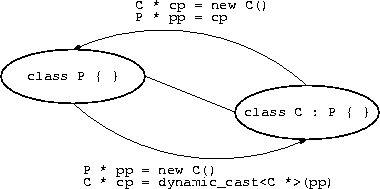- Also known as downcasting.
- Part of the run-time type information (RTTI) system.
dynamic_cast<target-class>(val)
-
valshould be a pointer or reference to a class instance. -
target-classshould be a pointer or reference to a class type. - Both must be pointers or references, you can't mix them.
- If
valdoesn't point to an instance of target-class, the dynamic cast returns 0.
